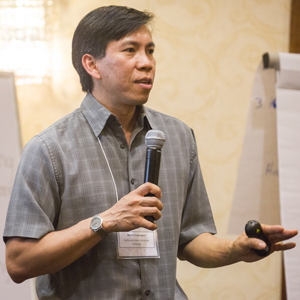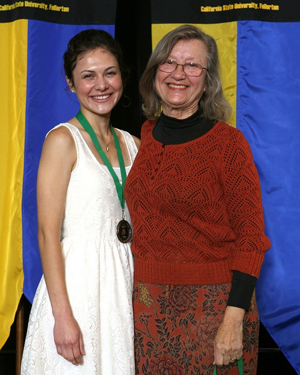Future Scientists
Research Preparation Program Sparks Interest in Science Careers
Aug. 9, 2012
As a child, Gabrielle Donnelly was fascinated by science and great scientists like Einstein and Galileo. But becoming a scientist did not seriously cross her mind until she enrolled at Cal State Fullerton, took an introductory biology class as a freshman and learned about the Research Careers Preparatory Program.
“The RCP Program was an amazing experience that opened my eyes to the extraordinary possibilities of science and laid the foundation for my scientific career,” said Donnelly, now a senior who plans to graduate in January and pursue a doctorate.
At a recent national conference on campus about enhancing research opportunities at undergraduate colleges and universities, Math P. Cuajungco, associate professor of biological science, gave a presentation about the CSUF program to science faculty.
Begun in 2009-10, the program was established to introduce freshmen and sophomores to research experiences and to give an insight into careers in science — other than health professions, said Cuajungco, who directs the program.
Recent studies show that the earlier students are exposed to science, technology, engineering and mathematics research activities, the more likely they will develop an interest in STEM careers, Cuajungco said.
The program is supported in part by Cal State Fullerton University Mission and Goals Initiatives and the National Institutes of Health-funded Minority Access to Research Careers, or MARC, program. Amybeth Cohen, director of MARC and professor of biological science, and William J. Hoese, associate professor of biological science, conceived the program.
Institutional support allowed the program to expand to recruit students from other departments, including chemistry and biochemistry and psychology. Next summer, students will receive additional lab training through the MARC program, Cuajungco said.
 Caption: Math P. Cuajungco, associate professor of biological science and director of the CSUF Research Careers Preparatory Program, speaks during a July conference held on campus. Photo: Matt Gush Download
Caption: Math P. Cuajungco, associate professor of biological science and director of the CSUF Research Careers Preparatory Program, speaks during a July conference held on campus. Photo: Matt Gush Download
“While the program raises student awareness and interests in research, it also has the potential to attract external funding from agencies that target broadening participation of underrepresented groups or minorities in STEM and biomedical research fields,” he added.
Through the one-year, course-based program, students receive guidance to improve academic and communication skills, including writing and oral presentation, as well as work in a research laboratory with a faculty mentor.
Nearly 40 students have participated in the program, with many selected to participate in upper-level research training programs funded by federal and state grants and offered through the College of Natural Sciences and Mathematics. This fall, 12 students enter the program.
Student benefits include gaining a sense of self-confidence, receiving faculty guidance early in their academic studies, as well as delving into real-life research efforts to inspire and impact their future career decisions, Cuajungco explained.
During Donnelly’s first semester of RCP, she worked in the lab of David B. Drath, professor of biological science, where her responsibilities included growing tumor cells.
“I saw tumor cells overrun a culture, and at that moment, I felt both excited and overwhelmed. I learned what cancer might look like in a person, but I also realized how hard it would be to cure cancer.”
After that experience, the aspiring scientist was hooked on pursing a scientific career and learned valuable tools to ensure her academic success.
“We discussed issues such as lab and field safety and research integrity. We learned how to keep a notebook and write a curriculum vitae. We presented scientific articles, as well as our own research, and worked to improve our communication and critical-thinking skills,” said the Placentia resident, who participated in the inaugural RCP program in 2009.
“We also talked about graduate school applications and research career opportunities,” Donnelly continued. “We learned about how to apply for a grant and how to write a manuscript. We discussed controversial issues and important scientific discoveries. And, we talked about the importance of communication between scientists, such as collaborations and attending conferences. In a nutshell, RCP was the all-you-need-to-know about science.”
As a result of her early research exposure, Donnelly landed a 2010 summer internship at Massachusetts Institute of Technology and studied how the brain develops and adapts to its environment. Currently a scholar in the university’s Howard Hughes Medical Institute Undergraduate Research Program, she plans to complete her thesis this summer.
As an HHMI scholar, she is working in the lab of Nikolas Nikolaidis, assistant professor of biological science. She conducts research on how cells respond to stress by determining how stress proteins change and differentiate to perform specialized functions, and how these changes are genetically and biochemically associated with human diseases, such as cancer.
Donnelly is currently applying to graduate schools, and after earning a doctorate in neuroscience, she will seek a career in neural engineering, an emerging field that combines both neuroscience and engineering to improve human health.
More information about the Research Careers Preparatory Program are available on the program website.

